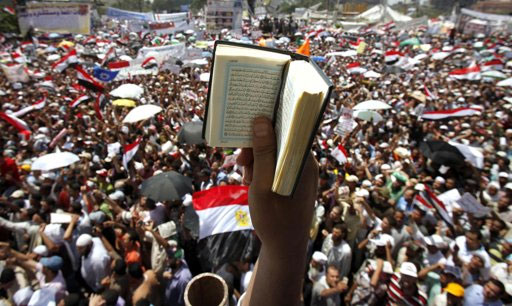While the West seemed somewhat sure about the political future of Egypt after the fall of Egyptian dictator Hosni Mubarak and the military council’s taking over the country’s political affairs, even the coming to power of a transitional government and extensive changes in the ruling government failed to meet the demands of the revolutionary people of that country.
People’s discontent with the weak approach in dealing with administrative corruption and negligence towards trial of Hosni Mubarak and ranking figures in his administration, their call for free elections and their rage over the weak foreign policy of the transition governments prompted reproduction of a new round of Egypt’s revolution with the youth movement in its center and with an Islamist approach against the wishes of the West so that it even inspired the older institutions such as Muslim Brotherhood to join the protests against the Supreme Military Council.
Therefore, the “Friday of Unity” protests, which are considered the most serious demonstrations after the fall of Mubarak and participated by all key political groups of the country, can be regarded a new phase in the process of Egypt’s political developments.
Nevertheless, maybe what was the cause of the highest reaction in the Unity Friday demonstrations was the strong leaning of slogans towards Islamist and religious demands. It was to the extent that Press TV reported that many of protesters demanded replacement of the interim military government with an Islamic government.
Aljazeera as well reported from Egypt’s Alexandria that people gathered at a main square in the city after Friday congregational prayers and held “Friday of Unity” demonstrations shouting Islamist slogans.
Shouting slogans such as “Islamism, Islamism”, “Nation has declared what it wants: Islam is its religion and its world”, “Sharia is above the constitutional law, they opened a new chapter in the demands made by the Egyptian people.
Some media sources have reported the presence in the protests of Egypt’s Salafi groups.
Under these conditions, several months after the commencement of Islamic awakening, the latest survey conducted by the Pew Research Center on US popularity in the region indicates that only 21 percent of Egyptians trust Washington's policies regarding Egypt. The survey also shows that Washington has been the most despised country to people in some Asian countries including Turkey, Pakistan and Jordan in 2011.
Besides the Islamist slogans of Egyptian protesters, the presence in the last Fridays’ protests of Muslim Brotherhood serves as another turning point in the Egyptian revolution.
Although, after the establishment of transitional government, Muslim Brotherhood as Egypt’s most comprehensive political population decided to cooperate with the government and the Supreme Military Council and did not respond to the protest calls made by the youth movement, certain analysts at Egyptian political circles spoke of a covert agreement of Muslim Brotherhood with the Supreme Military Council on sharing power and guaranteeing future parliamentary seats for the Brotherhood by the council.
Breaking of Muslim Brotherhood’s silence after Mubarak’s fall and its joining the protests is a serious development and indicates the intensification of differences between Muslim Brotherhood and the Supreme Military Council and in the meantime, the reproduction of the Egyptian revolution against the model desired by the US.
Speaking to Alalam news network, a member of the youth movement Mohammad Avad accused the Supreme Military Council of treachery to the revolution and collaborating with foreign agents.
Turning to charges leveled by the Council against the April 6 Movement, he said: “Surely, if the military council had any evidence against the April 6 Movement, it would not wait till now and would divulge them. This policy is a failed one and we will be present at the Tahrir Square until achievement of revolution’s demands."
Member of the executive committee of the youth coalition added, “Spreading rumors is the weapon the former regime agents have at present. Friday's demonstrations and consensus among political groups on this issue brushed aside all rumors on existence of differences among revolutionist groups."
Earlier, Chairman of the ruling Supreme Military Council, Hussein Tantavi had referred to the protests of the youth movement as guided by and being under the influence of foreign countries.
In a meeting with army commanders, he claimed that certain countries had brought their forces into Egypt in an attempt to create tumult and instigate the youth to launch strikes and sit-ins, and that the youth were not aware of this issue and the reality behind the scene.
While with the commencement of revolution in Egypt and certain countries of the region, some analysts believed that these developments had been planned in advance and orchestrated by the US, the new wave of developments in Egypt and Bahrain and reproduction of these revolutions with an Islamic approach totally different from the wish of the United States and the West shows the genuine roots of the Islamic awakening movement in the region; roots that the Supreme Leader Ayatollah Seyed Ali Khamenei had explicitly and bravely referred to at his historic Friday prayer sermon on the Egyptian people’s uprising.

